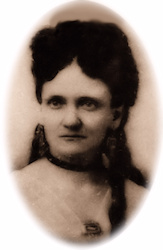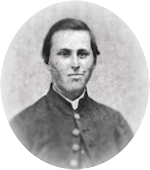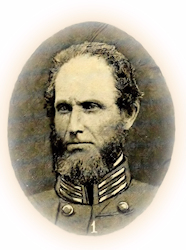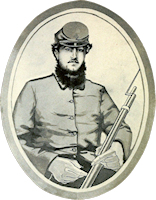1st. Lay in camp all day. In evening relieved 3rd Jersey on picket. Busy most all night drawing oats.
American Civil War Chronicles
“This is the 124th day of the campaign, exactly 90 of which we have been under fire.”–Army Life of an Illinois Soldier, Charles Wright Wills.
September 1, 2024
September 1st, ’64.
A real autumn morning. We were aroused at 3 a.m. and the air was then almost crisp. A breath of cold air is a luxury we can appreciate. A fresh, cool breeze is now stirring and I can almost hear the leaves falling. It is a real yellow fall and does me more good than aught else could, except a letter from home. Haven’t had one from you for ten days. A prisoner says that yesterday’s fight was rougher on them than the 28th of July fight. He said their brigade came up in front of our men, and though they did not stay more than long enough to take one look, when they got back under cover they were 500 men short. They afterwards charged again, and he said he doubted whether any of them got off alive and sound.
This is the 124th day of the campaign, exactly 90 of which we have been under fire. Have also moved 340 miles, though the direct road would be much less. The boys say we just finished the summer campaign in time to commence the fall ditto. I guess the movement surprised Hood. Prisoners all say they understood it to be a raiding party. ‘Tis a rather mighty one.
The country between these two railroads is rather better than any we have seen before in Georgia, but I never saw any in Illinois half as poor. Hardly any of the land has been under cultivation since the war commenced. A little sickly corn and a few patches of sorghum and millet are about all the farming evidence I have seen. [continue reading…]
A Rebel War Clerk’s Diary
September 1, 2024
SEPTEMBER 1st.—Clear, bright, and cool.
The intelligence from the North indicates that Gen. McClellan will be nominated for the Presidency. Judge Campbell, Assistant Secretary of War, shakes his head, and says he is not the right man. Our people take a lively interest in the proceedings of the Chicago Convention, hoping for a speedy termination of the war.
Senator Johnson, of Missouri, has a project of taxation for the extinguishment of the public debt—a sweeping taxation, amounting to one-half the value of the real and personal estate of the Confederate States. He got me to commit his ideas to writing, which I did, and they will be published.
Gen. Kemper told me to-day that there were 40,000 able-bodied men in Virginia now detailed.
There is a project on the tapis of introducing lady clerks into this bureau—all of them otherwise able to subsist themselves—while the poor refugees, who have suffered most, are denied places. Even the President named one to-day, Mrs. Ford, who, of course, will be appointed.
Forrest has completely rid the Country above of Yanks..,
September 1, 2024
September, Thursday 1, 1864
Today is the first of Autumn—No falling leaves or withering buds greet us—all is sunshine and happiness—fruit in abundance, and our bath as delightful as in Summer time. Mary Lou has more confidence in swimming, yet I can go farther—Poor Lou’s relations were with her, and she could not indulge. We all enjoy life at Waverly, more than any place I have chanced to meet since the War. Gen. Cheatam’s Orderly came today for the horses, the Maj. & Gov. have gone, so no more horse back pleasures for Lou & I. Forrest has completely rid the Country above of Yanks, all bright in his Camp, nothing deffinite from Va. Ga. or Mobile. Lou and I redeemed our character tonight, in opposition to Mrs. Reynolds and Mary Lou—
War Diary of Luman Harris Tenney.
August 31, 2024
31st. At daylight went on a reconnoissance towards Winchester. Found rebs and drove them to their main body on the Opequon. No one hurt. Very spirited little affair.
Robert M. McGill
August 31, 2024
Wednesday, 31st.—Passed through East Lake at 2 A. M.; going in direction of Jonesboro. Being sick, J. N. Smith and I lay down and slept till morning. Overtook regiment near Jonesboro about 12 M. Formed in line of battle at 3 P. M. Everything in readiness, and told that at the firing of the cannon on the left, we were to advance in two lines of battle. Soon the cannonading began, and our advance began. Not one in a hundred believed it would accomplish anything, but moved forward in splendid order through an open field, but just simply run in and out again, at a terrible sacrifice. Our company, at the beginning of the war, had, I suppose, one hundred and twenty-five men; now, when we went into this charge, we only had nineteen men, and eleven out of the nineteen were hit; one mortally wounded and several others severely. Brother I. L., wounded in leg with minnie ball; severe. (What a foolish charge. When we came to know the facts, two corps had charged five Federal corps, and them well fortified.) Our commanders are surely getting reckless.
(Note: picture is of an unidentified Confederate soldier.)
Diary of a Southern Refugee, Judith White McGuire.
August 31, 2024
31st.—The last day of this exciting, troubled summer of 1864. How many young spirits have fled—how many bleeding, breaking hearts have been left upon earth, from the sanguinary work of this summer! Grant still remains near Petersburg; still by that means is he besieging Richmond. He has been baffled at all points, and yet his indomitable perseverance knows no bounds. Sherman still besieges Atlanta. God help us!
We are again troubled in mind and body about engaging rooms; we find we must give up these by the 1st of October, and have begun the usual refugee occupation of room-hunting.
Letters from our friends in the Valley, describing the horrors now going on there. A relative witnessed the burning of three very large residences on the 20th of August. General Custar was stationed with his brigade of Michigan Cavalry near Berryville. He had thrown out pickets on all the roads, some of which were fired on by Mosby’s men. This so exasperated the Federals, that an order was at once issued that whenever a picket-post was fired on the nearest house should be burned. On the morning of the 20th this dreadful order was put into execution, and three large houses were burnt to the ground, together with barns, wheat-stacks, and outhouses. The house of Mr. –– was near a picket-post, and about midnight on the 19th a messenger arrived with a note announcing the sudden death of Mrs.–– ‘s sister, on a plantation not many miles distant. A lamp was lighted to read the note, and, unfortunately, a little while afterwards the picket-post was fired on and one man wounded. The lighting of the lamp was regarded as a signal to Colonel Mosby. During the same night the pickets near two other large houses were fired on. This being reported at head-quarters, the order was at once issued to burn all three houses. Two companies of the Fifth Michigan Cavalry, commanded by Captain Drake, executed the fearful order. They drew up in front of Mr. ––’s house and asked for him. ” Are you Mr. ––?” demanded the Captain. “I have orders to burn your house.” In vain Mr. –– remonstrated. He begged for one hour, that he might see General Custar [continue reading…]
Downing’s Civil War Diary.–Alexander G. Downing.
August 31, 2024
Wednesday, 31st–The same old thing over again. Nothing new from the front.[1] The sick and also the attendants here in the hospital were mustered for pay today. This is muster day throughout the entire army.
[1] Crocker’s Iowa Brigade at this time was down at Jonesboro, below Atlanta, stationed on the Atlanta & Montgomery Railroad, which was one of the main roads running into Atlanta from the South. The losses in the brigade while there, were small.—A. G. D.
0
August 31, 2024
August 31st. Camp in the woods. Called up very early. Our regiment detailed for picket duty. We advance towards the west, near Smithfield and the Opequon Creek. A strong picket line maintained. While everything is quiet with us, must keep a good lookout. Cannot tell what an hour may bring forth. We have been in the service for over two years on this the last day in August.
“Our brigade took one colonel, one major, three captains, one lieutenant and 30 men prisoners.”–Army Life of an Illinois Soldier, Charles Wright Wills.
August 31, 2024
Near Jonesboro, August 31, 1864.
We were afraid we would have no battle this month, but our fears were disappointed in a very summary manner this p.m. Hardee, in command of his own and Hood’s old corps, attacked the Army of the Tennessee again, the weight of the assault being on our corps. The second division, M. L. Smith’s, had the hardest of the fighting. The position our regiment held was unluckily too strong. They did not dare attack us. But we had a splendid view of the fight, both on our right and left.
Six Johnnie lines of battle debouched from the woods on our left, and swept right across our front on open ground, within long musket range, say 600 or 700 yards. This was 2:30 p.m. They were coming over to attack the 16th Corps. A five-gun battery on the right of our regiment and two guns on our left opened on them with spherical case, and threw some canister. They had hardly fired two shots when a Rebel 10-pound Parrott opened on them in front, and a Napoleon battery on our left flank. The Rebels shot admirably and you may imagine our regiment was in a pretty warm position, though our works and traverses made the danger but little.
In ten minutes from the time we first saw the Rebels they struck the 16th Corps, and after a right heavy fight of near an hour they came back flying. Our boys, though not near enough to do much effective shooting, put in 40 or 50 rounds apiece, just to keep our hands in. About the same time they struck Morgan L. they struck our first brigade and the left of our brigade. Our division repulsed them easily and [continue reading…]
A Rebel War Clerk’s Diary
August 31, 2024
AUGUST 31st.—Bright and pleasant.
The only news to-day was a dispatch from Gen. Hood, stating that the enemy had leftHolly Springs, Miss., for the Mississippi River, supposed to reinforce Sherman, whose communications are certainly cut. It seems to me that Sherman must be doomed. Forces are gathering from every quarter around him, and it is over 200 miles to Mobile, if he has any idea to force his way thither-ward.
Attended an auction to-day. Prices of furniture, clothing, etc. still mounting higher.
Common salt herrings are at $10 per dozen; salt shad, $8 a piece. Our agent was heard from to-day. He has no flour yet, but we still have hopes of getting some.
Still no news from home, and nothing different from the Army’s—
August 31, 2024
August, Wednesday 31, 1864
After all my sitting up so late, Mr. Clapp went off and forgot my letter, or at least, I failed to awake in time to give it to him.
We have had a pleasant day, as usual, to me each day is delightful at Waverly—there is not much variety, but ’tis always pleasant—We all together had a nice bath, although ’twas very cold. I was really timid and foolish in the Water, tried to cross, but did not get more than half way, hope I will succeed some time.
Still no news from home, and nothing different from the Army’s—
August 1864
August 31, 2024
August 4—Move through Martinsburg and camp near Falling Water.
August 5—Move early and cross the Potomac and camp a little beyond St. James College.
August 6—Move early through rain and stop at Williamsport. Meet Mr. E. P. Steffy and others Quite a stir about those hostages from Hagerstown. Cross river late and camp.
August 7—Move early past M. and go into old camp near Bunker Hill. Such running and chasing, back and forth, crossing and re-crossing, night and day! Such is war.
August 9—Dine with Mr. Woolridge.
August 10—Move early. Go by Mr. Silver’s and spend a few hours. Ride to Division four miles north of Winchester.
August 12—Move and camp two miles N. W. of Strasburg.
August 13—Troops in line of battle.
Sunday, August 14—Quiet. Bro. Power preaches in a. m. and I preach in p. m. Prayer meeting at night.
August 16—Preach to Hoke’s Brigade in a. m. and to Johnston’s in p. m. Prayer meeting at night.
August 17—Our men drive the enemy from W. Mills.
August 18—Pass through Winchester. See mills and wheat barns lately burned by the enemy.
August 19—Move early towards Bunker Hill. Men go into old camp.
August 20—Sudden alarm. Quiet all the balance of the day.
Sunday, August 21—Meet Rev. Wm. Hank. Heavy skirmish most of the day. Five in my Regiment killed: Pennington, Williams, Wilkins, Newkirk and Forsythe.
August 22—Drive enemy through Charlestown and two miles beyond. Heavy rain.
August 23—Quiet all day. Sup with Rev. J. Wm Jones and family. Lovely home.
August 24—Meet Rev. Marsh. Sudden attack on our front. Soon quiet.
August 25—Corps moves and camps about Shepardstown. Meet Rev. Kilgo and others. My birthday! When shall I spend a birthday with my wife and children?
August 26—Preach to Regiment. Dine at Mrs. Evans’. Troops all move to Leetown. Meet Chaplain Brooke, of Imboden’s Cavalry.
August 27—Division moves to Bunker Hill.
August 28—Preach in a. m. Hear from Mary.
August 29—Men move out and spend day on pike. Spend night in old camp.
August 30—Brother Rutledge preaches for me Write letter of condolence to Brother L.
August 31—Division moves to M. and drives out enemy’s cavalry. Returns to camp weary. I dine with Harry Thomas.
War Diary of Luman Harris Tenney.
August 30, 2024
30th. Marched at 12:30. Received letter from Mrs. T. Wood. Camped at Berryville.
Downing’s Civil War Diary.–Alexander G. Downing.
August 30, 2024
Tuesday, 30th–It is warm and sultry. There are not so many sick and wounded coming in as there were a few days ago. Quite a number, at their own request, are being sent out to the front. When the convalescents are able for duty, they can’t stand it to remain here; the first thought is to get back into the lines. Taking care of the sick is no light work, if one does his duty. The worst is that there is so much sad, heart-rending work to do, ministering to the dying, taking down their farewells to be sent to their homes; then after death, we have to roll the bodies in their blankets and carry them to the “deadhouse,” where other hands take charge and bury them without coffin or ceremony.
0
August 30, 2024
August 30th. This fine morning finds us in the woods. We need this rest and sleep that we are having at this time. This is fine timber land. Great large trees, mostly white oak and black walnut. We are enjoying this very quiet time. Very thankful for it.
…two or three days is a long time for us to remain in camp without some move.
August 30, 2024
AMP NEAR BUNKER HILL, VA., Aug. 30, 1864.
Dear Mother:
I take this occasion to drop you a few lines, as you will be more likely to get it if I send it by Capt. Thompson than by mail. I got with the regiment last Saturday at Bunker Hill, as they fell back from Charlestown. We went into camp and remained quietly until yesterday morning when the Yankees advanced on Martinsburg pike. We were thrown in line of battle and remained so all day; the Yankees having retired we went back into camp a little after dark. We received orders last night to be ready to move this morning at sunrise. ‘Tis now about eleven o’clock and we are still in camp and will probably remain here the remainder of the day, though two or three days is a long time for us to remain in camp without some move. The boys all seem to be in very good spirits, though they look quite thin from the hard marching they have had to do since they left Richmond. It’s my opinion that the army will fall back towards Strasburg in a few days, though it’s only a conjecture of my own. I have been in excellent health ever since I left home, though at times I have had the blues pretty bad. I begin to feel perfectly at home and everything begins to feel like old times. I am in hopes we have done most of our hard marching that is the only thing I am dreading now. The weather has turned some cooler, the nights are quite cool, making a heavy blanket feel quite comfortable.
Tell Mr. Rhodes that Blake is with the Company and is looking very well, he was only at the hospital a few days from being broken down. He is asleep now, or I would ask him if he wished to send any message. Write soon. My love to all the family. I remain as ever,
Your sincere and affectionate son,
WALTER.
Letters from two brothers who served in the 4th North Carolina Infantry during the Civil War are available in a number of sources online. Unfortunately, the brothers are misidentified in some places as Walter Lee and George Lee when their names were actually Walter Battle and George Battle. See The Battle Brothers for more information on the misidentification.
A Rebel War Clerk’s Diary
August 30, 2024
AUGUST 30th.—Bright and pleasant.
Gen. Hood telegraphs Gen Bragg that the enemy has shifted his line somewhat, drawing back his left and extending his right wing. Also that dispatches from Wheeler (August 19th) informs him that Dalton was captured, as stated, with 200 prisoners, 200 mules, a large amount of stores; several train supplies destroyed, as well as twenty-five miles of railroad in Sherman’s rear. If that don’t disturb the equanimity of Sherman, he must be an extraordinary general indeed.
Gen. Lee says the Bureau of Conscription has ceased to send forward recruits, and suggests that the conscript officers and their tens of thousands of details be now ordered into the ranks themselves. The Secretary does not agree to this, and the Assistant Secretary’s son-in-law is one of “the Bureau.”
Nine-tenths of the President’s time and labor consist of discriminating between applicants for office and for promotion. They are all politicians still! And the Secretaries of State, Navy, and the Postmaster-General are getting to be as fat as bears, while some of the subordinates I wot of are becoming mere shadows from scarcity of food.
No news from any portion of the Country—
August 30, 2024
August, Tuesday 30, 1864
Mrs. Reynolds and Mrs. Johnson went to Columbus this morning, Col. Young also. Lou, Mary L. and I had quite a nice time although alone. The Miss’s Burt called. Mr. Clapp came out with Col. Young on his way to Holly Springs. We all had a short bath this eve, as the Gentleman wanted to go in. Mrs. Young and Maj. Henderson took Tea, and we all spent a very pleasant eve. I sat up very late writing to Capt. Henderson—
No news from any portion of the Country—
War Diary of Luman Harris Tenney.
August 29, 2024
29th. Up early but did not march. Considerable firing in direction of Smithfield. No reports. Good news in papers.
Robert M. McGill
August 29, 2024
Monday, 29th.—Yanks have all left our front. The general opinion is that they are retreating, but if so, why are we not following them?
(Note: picture is of an unidentified Confederate soldier.)
Downing’s Civil War Diary.–Alexander G. Downing.
August 29, 2024
Monday, 29th–News came that General Grant had an engagement with the rebels on the Danville railroad near Petersburg, Virginia. The loss was heavy on both sides, but Grant succeeded in holding his place. The fight took place on the 21st of the month.
“In one and one-quarter hours we utterly destroyed rails and ties for twice the length of our regiment.”–Army Life of an Illinois Soldier, Charles Wright Wills.
August 29, 2024
August 29, 1864.
I would much like to know what the Chicago Convention is doing to-day. We hear there is a possibility they may nominate Sherman. How we wish they would. He would hardly accept the nomination from such a party, but I would cheerfully live under Copperhead rule if they would give us such as Sherman. Sherman believes with Logan, “that if we can’t subdue these Rebels and the rebellion, the next best thing we can do is to all go to hell together.”
We have already thrown our army so far to the right that our communications are not safe, but yet we can’t quite reach the Montgomery or Macon railroads. It is determined to leave the 20th Corps at Vinings to guard the railroad bridge, and I think to move all the rest to the right. The army has just moved its length by the right flank. Looks easy and simple enough, but it took three days and nights of the hardest work of the campaign. The whole line lay in sight, and musket range of the enemy, not only our skirmishers, but our main line, and half a dozen men could, at any point, by showing themselves above the works, have drawn the enemy’s fire. A gun, a caisson, or a wagon could hardly move without being shelled. On the night of the 25th, the 20th Corps moved back to the river to guard the railroad bridge seven miles from Atlanta; and the 4th moved toward the right. [continue reading…]
0
August 29, 2024
August 29th. Called up very early this morning after a quiet night. We are about four miles south of Charlestown. Heavy cannonading in the direction of Winchester, which lies about ten miles southwest of Charlestown. All is quiet with us as we rest and sleep. Rations are good and plenty. Consist of hardtack, pork, coffee, sugar. Report reaches us that our boys are in possession of Winchester. Weather fine. Taking life easy in these woods.
A Rebel War Clerk’s Diary
August 29, 2024
AUGUST 29th.—Bright and pleasant morning; another fine shower last night.
No important intelligence from the armies.